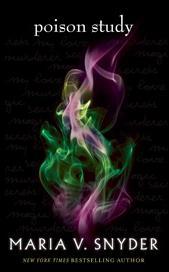POISON STUDY / MAGIC STUDY / FIRE STUDY
 SUMMARY
SUMMARY
Having been locked up in the Commander’s (the leader of the Ixian military dictatorship) dungeon for murder for the last year, Yelena is awaiting her execution, when she’s approached with an intriguing opportunity: The chance to become the Commander’s food taster instead. Of course, she accepts. But what follows is more than just an exercise of tasting and identifying poisons – because Ixia’s capital is packed full of secrets and plots, and there may even be a war brewing with Sitia.
The Chronicles of Ixia is made up of three trilogies, of which the Study trilogy is the first. It comprises three novels and two additional novellas: Poison Study (#1), Assassin Study (#1.5), Magic Study (#2), Fire Study (#3) and Power Study (#3.5).
 STORY [3/5]
STORY [3/5]
The story is something of a mixed bag: Poison Study is incredible, and follows Yelena as she learns to navigate the Commander’s court and all the political manoeuvring that’s going on within it, while at the same time coming to terms with her crime, and the events that drove her to commit it. It’s fast-paced (but not too fast-paced) and fascinating, and makes for an incredibly engrossing read.
On the other hand, Magic Study brings several new story threads into play, and while they’re all quite interesting individually, the quick pacing of the story means that they’re frequently tangled up, and I often found it quite difficult to follow everything that was going on. This problem was fixed towards the end of Fire Study, but it still impacted my enjoyment of the series as a whole quite a bit.
 CHARACTERS [4/5]
CHARACTERS [4/5]
Yelena has all the hallmarks of my favourite kind of protagonist: She’s sympathetic and relatable; suspicious of kindness or good fortune; yet still loyal, and driven by a desire to do what she believes is right, regardless of the cost. This last trait is also a major flaw in her character, though, because she’s also very convinced that her way is the only right way of doing things (even though they’re clearly not), which often lands her in huge trouble… and which could, at times, be rather irritating.
Of the secondary characters, the most important is Valek, the Commander’s chief of security (a.k.a. personal assassin) and Yelena’s teacher. He’s definitely one of the more interesting characters in the series, as he maintains an air of mystery for much of it – it’s always difficult to tell what’s going on in his head – and because (as seen through Yelena’s eyes) he often seems infallible, it’s always a bit of a shock when he shows a more human side.

Other characters include: Ari and Janco, two guards that Yelena befriends, and who have a really great dynamic both with her and with each other – the novella Power Study is told from their perspective, and makes for a fun aside to the main story. In the first book there’s also Rand, the Commander’s cook, who befriends Yelena early on in the story for reasons of his own; and later on we’re also introduced to Irys, a mysterious Sitian magician who has snuck into Ixia.
In Magic Study, there’s a whole slew of new characters introduced, but only a few of them really stood out: Leif, who started off really annoying, but grew on me as the story went on; and Cahil, who was the opposite – he initially seemed as if he was going to be really interesting, but as the series went on, his characterisation became shallower and shallower, until he had about the depth of a puddle. Lastly, there was Moon Man, a Sandseed magician (called a Story Weaver) who took it upon himself to teach Yelena, but mostly tried to do this in the form of cryptic remarks that he refused to explain. I never quite managed to figure out Moon Man’s character, but I did find myself liking him, and the relationship that he shared with Yelena.
 ROMANCE [4/5]
ROMANCE [4/5]
Given that this is a YA series, I was expecting a romance of some kind (maybe even a love triangle!) and I therefore spent much of my time while reading Poison Study waiting for Stereotypical Love Interest to show his face. So I was pleasantly surprised when he didn’t – or, at least, not in the way that I had expected.
There is a romance, of course (or I wouldn’t have bothered including a romance section in this review), but it’s built-up very slowly, and the love interest in question (who I won’t name for spoilery reasons) was masterfully chosen. I’ve (again) knocked one star off this section because of Magic Study, where Yelena and Love Interest’s relationship seemed to stagnate rather (there was very little development at all), but that issue (as with many of my problems with that book) was thankfully fixed in Fire Study.
WORLD-BUILDING [4/5]
Ixia fascinates me – it’s one of the most interesting literary settings I’ve ever come across. It’s essentially a military dictatorship, and it was seized by force from the now-extinct royal family many years before Poison Study starts (but still well within living memory). Citizens are required to wear uniforms at all times that reveal their occupation and place of origin; they need to get permission from the General of whichever Military District they live in if they want to move, or get married; and various other liberties are restricted. Bearing that in mind, it would seem almost natural for the story to have major dystopian themes – and yet, Ixian society actually works. A certain amount of corruption exists within the ranks of the Commander’s Generals, but because the Commander himself is not corrupt, he is able to keep it in check, and the Ixian people don’t appear to feel oppressed at all.
Sitia – the neighbouring country where the majority of Magic Study and Fire Study takes place – provides an interesting contrast to Ixia. Because Ixia is all that Yelena knows, she sees Sitia as an alien place, and all its customs are foreign to her – even though its society is much closer to something you’d expect to find in the real world. Sitia is vast, however, and Yelena spends much of her time there travelling, so the different areas (and they are all very different) are never really fleshed out in the way that Ixia was in Poison Study. Because of this, I felt that I could only give four stars for world-building, rather than the five that I would give to Poison Study individually.
WRITING [3/5]
The writing is mostly solid, but nothing special. As I’ve already said, I had significant issues with the pacing in the second and third books, which brought the ranking down a star, and Snyder also occasionally slipped into a bizarre style that seemed to be summarising the story rather than actually telling it – though thankfully this wasn’t something that happened very often.
OVERALL IMPRESSION [4/5]
A fantastic debut novel with a sadly weak follow-up, though the story does pick up in the second half of Fire Study, and ends on a definite high note. Poison Study on its own is a five-star read, or close to it, but the two sequels (and Magic Study in particular) drag the overall rating down a little. As regards the two novellas… they’re fun but not essential, and I wouldn’t recommend bothering with them unless you’re particularly invested in the characters of either Valek (Assassin Study), or Ari and Janco (Power Study).
RECOMMENDED FOR…
Fans of Tamora Pierce’s work, particularly the Beka Cooper trilogy, and readers who liked Vin in Brandon Sanderson’s Mistborn trilogy will probably also like Yelena. Poison Study will also appeal to fans of dystopian literature for its setting, though its sequels may not.